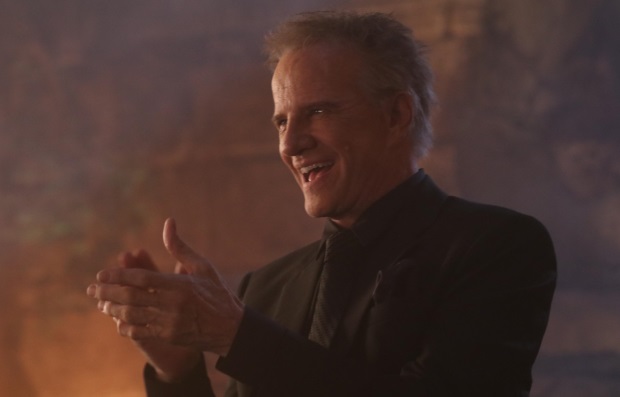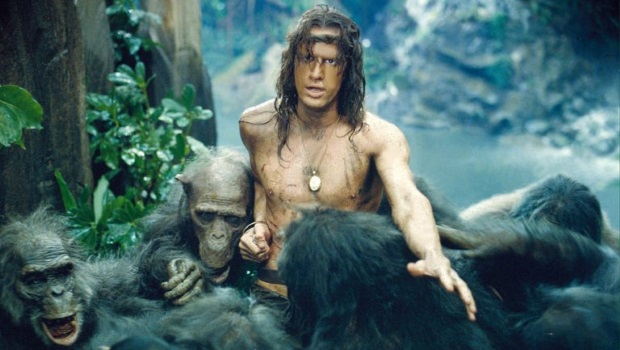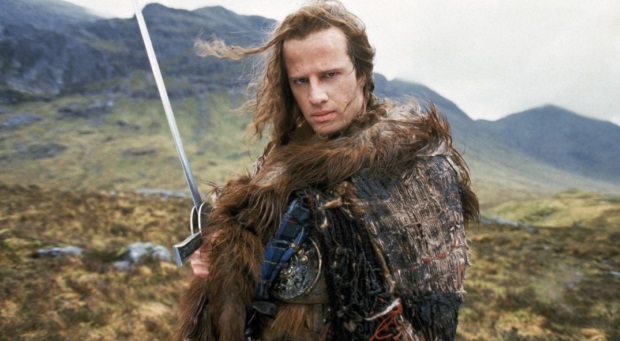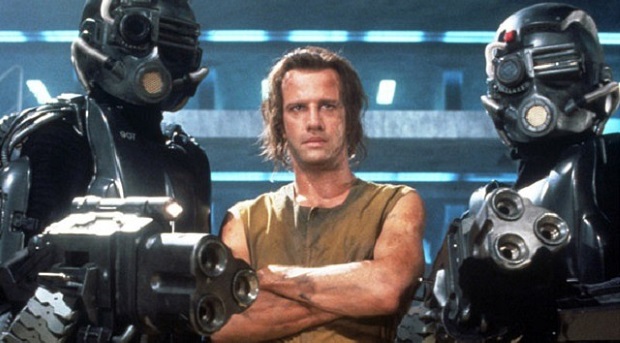Christopher Lambert interview: Kickboxer: Retaliation, Highlander, Fortress and more
Christopher Lambert chats to us about Kickboxer: Retaliation, Fortress, Highlander and a whole lot more...
When faced with writing an introduction to Christopher Lambert’s work, it transpires that even when you try to resist making puns, it’s borderline impossible not to make a reference to there being only one of him. Indeed, such is the enduring legacy of Highlander and his performance in it, that it’s what many of us think of first when hearing his name.
The beauty of his career though, is that it encompasses so many films that are beloved by audiences worldwide – he’s had mainstream hits, movies that have become major cult classics and accumulated accolades in independent French cinema.
We were fortunate enough to get some time with him as Kickboxer: Retaliation breaks its way onto DVD and Blu-ray on the 5th March, the second film in the newly rebooted trilogy. The first, Kickboxer: Vengeance, was a solid slice of eighties style action, cleverly casting skilled fighters to lend real viscera to the confrontations, while bringing the mighty Jean Claude Van Damme back to the fold. Retaliation will finally see Lambert and Van Damme on screen together for the first time, alongside returning star Alain Moussi as Kurt Sloane – a man who seems destined to suffer in every incarnation.
Usually when conducting a phone interview, the call is connected by a PR company, so you can only imagine my surprise when I answered with a standard hello, only to have the very familiar voice at the other end say “Hey, it’s Christopher Lambert calling!” Such is his unique tone, that it’s a shame to lose it in the transcription, but it immediately echoed the multitude of characters he’s played over the years, making the interview all the more exciting.
Our conversation took place five days before Christmas, so there was no chance to have seen Kickboxer: Retaliation beforehand, but that was hardly a problem when there were so many films we wanted to ask about and he was gracious enough to talk about as many as we had time for, so without further ado…
I grew up on your movies and have always had a particular attachment to the action and science fiction genres, especially the ones you’ve starred in, but what appealed to you about Kickboxer: Retaliation?
The fact that Kickboxer was a movie that I like, you know it was a cult movie and the fact that I was offered to play a bad guy, which didn’t happen very often in all the movies I’ve been making and I always wanted to play a bad guy.
I hadn’t considered that – you have played a lot of heroes.
So it was good feeling the temperature of what would I put in and what would I bring into playing a bad guy today, to maybe making him different, so it was just exciting and also I love kickboxing as a martial art.
Back in the 80s and early 90s, particularly when I was growing up and watching as many films as I could, icons from that era rarely appeared together and a lot of it seemed to be salary based – it would have just been too expensive and everyone was off doing their own films, so I think it’s really great now that since The Expendables, I’m getting to see a lot of my heroes in films together, had you ever crossed paths with Jean Claude Van Damme before working on Kickboxer: Retaliation?
Yes many times, many times I’ve known Jean Claude for… ooh thirty years.
Ah, because you never worked together did you?
No we never worked together, but we knew each other from Los Angeles, from Cannes, from Planet Hollywood, so we knew each other yeah and he’s a very good person, he’s a gentle person.
Do you have many scenes together in Kickboxer: Retaliation?
No we have one big fight scene, action scene, but we’re of course in the same arena where Alain is fighting, but we’re far away from each other. The only scene we’re in together is a big dialogue and sword fight scene.

Ah nice!
I think it’s going to come out pretty well, it’s pretty exciting because there’s lots of moves and different moves.
It’s always great to see you with a sword – is that maybe a reference back to the Highlander?
Yeah it could be, but different swords though.
So a different discipline, then?
Yeah.
The reason I’m still drawn to movies like Kickboxer: Retaliation, is that I find it sad that pure action movies seem to be a dying genre, where physicality is now replaced with special effects. Have you ever thought about why that’s the case?
The thing is with computer graphics today, with special effects, it’s so easy to basically forget the actor and with some action movies, I have the feeling I’m watching a video game. There’s nothing real in them, there are no feelings, like real feelings, deep feelings, hard feelings. It’s most of time ‘I’m butch, I’m strong, therefore nothing can reach me’ and I think it’s wrong, because what’s interesting in an action movie is the sensitive side of it.
That’s one of the reasons I did Highlander for example, it was the romantic side of the movie that attracted me. The action? I knew the action was going to be good, because we worked twelve weeks, if not more, just on the routine – the sword fighting routine. But what interested me is – what are we going to do with the mortality factor, that this guy is carrying on his shoulder for centuries, that’s what interested me.
So what attracted me also in Kickboxer: Retaliation is that the director told me “We’re not going to use any effects, any CGI, any wires, they’ve been training for months and they’re gonna fight” and I witnessed that, because I was in the arena and I was seeing Alain being thrown from left to right, against walls, or on the floor – you were fighting. So that also the purity of the fights gives the audience something different.
I think you’re right and when you combine that with heart, that’s what makes it its interesting and where you mentioned Highlander as an example, that film makes me cry every time.
Yeah! But that’s the point, is that there’s absolutely no reason that an action hero can’t have feelings.
The first film I saw of yours was Greystoke: The Legend Of Tarzan which I saw for someone’s birthday trip to the cinema when I was a kid and it left an indelible mark, as the film was quite dark and brutal in its way, but did you ever think back then that physicality would become a part of your movie career, because again it combined the physical with heart?
I knew that at least I was only going to be attracted to action movies with a sensitive hero. I wouldn’t… I think it’s the cracks in the character, when they’re a human being, that makes people interested. If you have wounds, inside wounds, it’ll be more interesting than someone who’s just vapid. So I think an action hero – if he’s a hero, obviously he’s got more inside wounds than other people, so we want to see them.

Regarding Greystoke, I hadn’t quite considered until thinking back on it, but that must’ve been quite a competitive, sought after role at the time. What do you remember from the audition process?
That was ooh… [he thinks back] At first we were in a room, in a gymnasium with like four hundred people and Hugh Hudson (the director) was there with his casting director Patsy Pollock and he asked us to jump, to do some jumps, so we started to jump like four hundred people jumping up and down! And at one point I thought, you know after five minutes, I was going ‘God this is so boring’ so I sat down. Not to catch the attention of anybody, I just sat down, because I was fed up with the jumping and having this guy seated in the middle of four hundred people, caught the eye of Patsy Pollock who was the biggest casting director in the world at the time and she said to Hugh Hudson “You gotta test this guy” and Hugh – I didn’t know that until afterwards – and Hugh looked at her saying “Are you fucking out of your mind?” I had big glasses, I was a matchstick and Patsy said you have to test this guy, so he tested me.
I went to a screen test in London, they had built a kind of jungle, but you know it was like a tree and some leaves and stuff like that and Hugh Hudson, I never knew, but he told me afterwards, was testing – he’d done a world tour trying to find Tarzan, so at the end of his world tour, after seeing I have no idea – two/three thousand people? He picked like seven to ten people and said “I’m gonna do screen test with these ten.” And I was part of them. So I did the screen test and Monday he called my agent and he said “Well, you’ve got the part.” That was it.
So I left for London for six months of heavy training – very heavy, because I had to put… basically I was weighing fifty eight kilos for six foot and when I did Tarzan I was weighing eighty six kilos, so I roughly put close to thirty kilos of pure muscle on, because no weight lifting, it was gymnastics, it was martial arts training, it was real training, so no pumping. It took six months, I was doing about two to four hours in the morning and three to four hours in the afternoon, with the people who were gonna be in the chimp suits, we were doing a lot of gymnastics, a lot of rope climbing, high jumping and stuff like that, so that was it.
It’s such a good performance. In terms of exposure is that what led into Highlander?
Well it didn’t directly lead to Highlander, because I did two French movies before Highlander, I did a movie called Words And Music (Paroles Et Musique) with Catherine Deneuve and then I did Subway for Luc Besson and then I did Highlander.
Sorry I’m going so nostalgic, but I remember Highlander coming out and remember the buzz around it, because Queen had done the music and it had this cool, rock ethic and people were talking about the trailers before it was released. Was the release an exciting time for you?
Yeah very, but what was also very interesting is that Queen were meant to do only one track – it was the opening credits, Princes Of The Universe, that was the deal. So they sat down for a private screening for them in a movie theatre and Freddie Mercury when he came out said “I’m doing the whole fucking album! This movie is too fucking great!” he wrote the songs in four weeks and went into studio and it was one of the biggest selling albums of their career. So you know it’s strange, it’s like nobody ever thought that this movie Highlander was gonna be, thirty years later, still a cult movie.

And it must make you smile that you achieved immortality through the actual film?
Yeah and also when you shoot the movie, when I was reading the script the only thing that interested me was to say ‘Well the action is going to be great, because Russell [Mulcahy] is an incredible visual director, the look of the picture is going to be great’ but what attracted me first was the romantic side of immortality. So you know we weren’t… nobody on the set was thinking ‘My god, this movie is gonna become a cult movie’ No, you’re just making a picture, you enjoy making it and you hope that the audience is gonna enjoy it as much as you did when you were making the movie, that’s all.
And it happened, that’s all and also you realise that it doesn’t always… you always enjoy making movies, but you cannot calculate which one is going to please the audience, which one is not going to please the audience, that’s the way it is, so forget about that, stop thinking and just do!
It’s the best way to be – I find it even now in the internet age and with online criticism, you just do what you want to do and hope people like it, I think.
Yeah!
I know the subject of a new Highlander film keeps coming up and you’ve been asked about it consistently over the years, but I know that momentum is picking up again – have they spoken to you about it recently?
No, because first of all I’m not in the loop. I read a few things from the director saying “I think it would be great to bring Christopher back” you know as a wink to the audience, which I think is good idea. If I do it I’d be happy, if I don’t do it I’d be happy, you know? I’m not waiting on that. I’ve got a finished movie after Kickboxer, which is completely different, then I’m doing another movie – an action thriller – next year, so we’ll see, we’ll see. After over eighty five movies, as I’m putting it, I have the right to choose what I want to do.
I just re-watched Fortress this week…
Yeah!
And it still holds up really well, even on a big high definition TV, because the sets and again, the story and the characters are strong – it even manages to keep the future aesthetic from looking dated. Did you have a lot of physical sets to work on with that film?
Yes, yeah, yeah we did, all of us. But it’s interesting you mentioned Fortress, because I think Stuart Gordon is an incredible director, he is incredibly smart and way ahead of a lot of people. When you look at the soldiers that he built, his robots, that’s exactly what we’re trying to do to go to war today, if we have to go to war, is to bring people like that. And it’s the AI, before the AI – the artificial intelligence before [it happened].

I remember, because you cannot forget this [laughs] the best review was – because the movie got really good reviews – but the best one was in the New York Times, which I was flabbergasted about, because I was saying “Wow the New York Times gave me like four stars for Fortress!?” [laughs] They did because they saw the vision of Stuart and they were right, because apart from the fact that movie was big hit worldwide, he had – and he fought for that vision against the producers, against… he said “No, no, no trust me, trust me, let me do my things” and as he wasn’t going over budget and stuff like that [they let him] and it paid in the end.
Absolutely, because now it’s another timeless movie. I think we’re out of time but my editor, who has often written about Fortress, would like to know if there are plans to make a Fortress 3?
Well I’ve no idea, it’s not in the loop! Happy Holidays!
And Christmas was made. Christopher Lambert, thank you very much!
Kickboxer: Retaliation will be available on DVD & Blu-ray on March 5th.